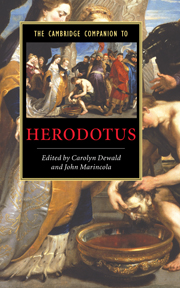Book contents
- Frontmatter
- Introduction
- 1 Herodotus and the poetry of the past
- 2 Herodotus and his prose predecessors
- 3 Herodotus and tragedy
- 4 The intellectual milieu of Herodotus
- 5 Meta-historiē: Method and genre in the Histories
- 6 The syntax of historiē: How Herodotus writes
- 7 Speech and narrative in the Histories
- 8 Herodotus, Sophocles and the woman who wanted her brother saved
- 9 Stories and storytelling in the Histories
- 10 Humour and danger in Herodotus
- 11 Location and dislocation in Herodotus
- 12 Herodotus and the natural world
- 13 Herodotus and Greek religion
- 14 Warfare in Herodotus
- 15 Herodotus, political history and political thought
- 16 Herodotus and the cities of mainland Greece
- 17 An alternate world: Herodotus and Italy
- 18 Herodotus and Persia
- 19 Herodotus and foreign lands
- 20 Herodotus' influence in antiquity
- Glossary
- Timeline
- Bibliography
- Index
- Series List
2 - Herodotus and his prose predecessors
Published online by Cambridge University Press: 28 January 2007
- Frontmatter
- Introduction
- 1 Herodotus and the poetry of the past
- 2 Herodotus and his prose predecessors
- 3 Herodotus and tragedy
- 4 The intellectual milieu of Herodotus
- 5 Meta-historiē: Method and genre in the Histories
- 6 The syntax of historiē: How Herodotus writes
- 7 Speech and narrative in the Histories
- 8 Herodotus, Sophocles and the woman who wanted her brother saved
- 9 Stories and storytelling in the Histories
- 10 Humour and danger in Herodotus
- 11 Location and dislocation in Herodotus
- 12 Herodotus and the natural world
- 13 Herodotus and Greek religion
- 14 Warfare in Herodotus
- 15 Herodotus, political history and political thought
- 16 Herodotus and the cities of mainland Greece
- 17 An alternate world: Herodotus and Italy
- 18 Herodotus and Persia
- 19 Herodotus and foreign lands
- 20 Herodotus' influence in antiquity
- Glossary
- Timeline
- Bibliography
- Index
- Series List
Summary
Herodotus being so miraculous, and the Herodotean urge to seek origins still being so strong with us, the desire to historicise him remains irresistible. Knowing what lay around and behind him could make clearer what was unique about him; it could, assuming an agreed definition of history, tell us whether he really was its Father. It happens that we do have a certain amount of information - desperately fragmentary, permitting only the smallest number of verifiable hypotheses - about his predecessors and contemporaries. But in truth, if one wishes to know what relationship exists between Herodotus and his colleagues, it is best to look first in Herodotus' own text.
Herodotus is frequently argumentative and judgemental. From the very first chapters he rejects foolish opinions, weighs up conflicting evidence, makes firm pronouncements on method: were it not for his winning charm, one could find all this very irritating (as indeed some readers have). For all its prominence, however, scholars have only recently begun to relate this feistiness to Herodotus' conception of himself as an historian. For it is obvious (now) that he must be arguing with someone, and a close study of the intellectual terrain over which these battles and negotiations are being conducted can do much to illuminate Herodotus' situation as a writer.
- Type
- Chapter
- Information
- The Cambridge Companion to Herodotus , pp. 29 - 45Publisher: Cambridge University PressPrint publication year: 2006
- 13
- Cited by

